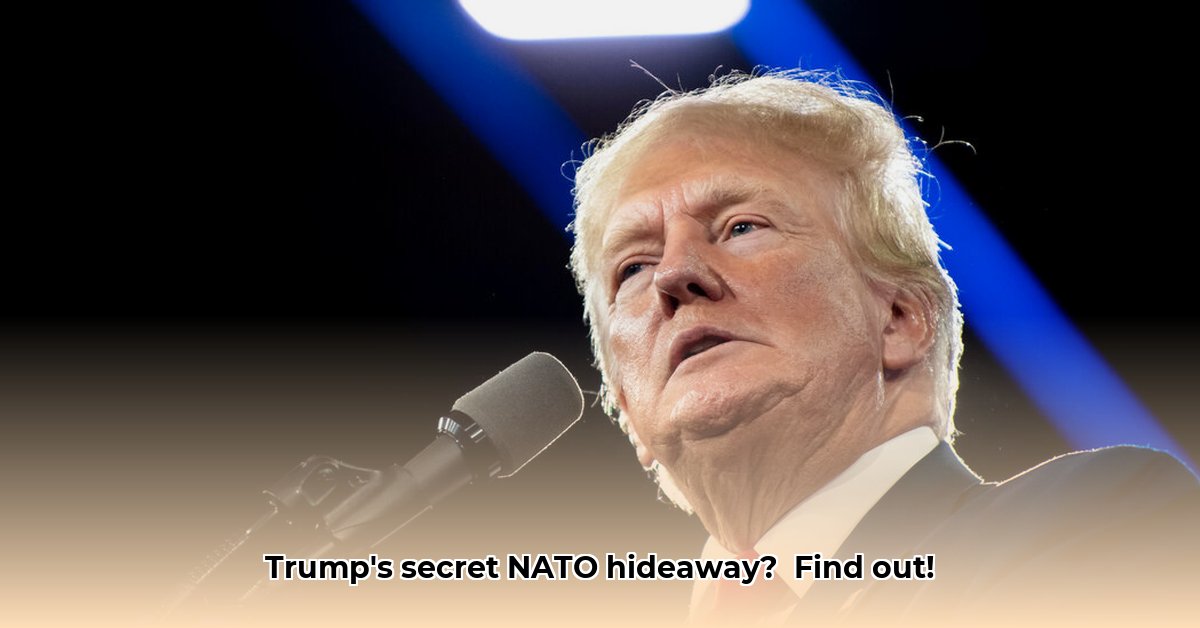
From Seaside Stay to Royal Residence: A Presidential Accommodation Shuffle
The 2025 NATO summit in the Netherlands witnessed an unexpected shift in presidential accommodation. President Trump's planned stay at the luxurious Huis ter Duin hotel was abruptly changed to the Paleis Huis ten Bosch, the Dutch royal palace. This seemingly minor detail reveals complexities in summit security and international diplomacy. The switch raises critical questions about initial security assessments, inter-governmental communication, and the overall management of high-profile visits. This analysis examines the factors influencing this decision and its broader implications.
Security: A Paramount Consideration
The primary driver for the relocation appears to be security. While Huis ter Duin undoubtedly possessed robust security measures, the Palace offers pre-existing, heightened protection suited to a head of state. The move signifies a recalibration of security protocols, suggesting either a reassessment of the initial risk assessment or the emergence of unforeseen threats requiring immediate action. This raises questions about the adequacy of the initial security plan for Huis ter Duin and the nature of the heightened risk that prompted the last-minute change. Did intelligence suggest a specific, evolving threat?
Communication Breakdown: Timing Discrepancies
Discrepancies surround the timing of the decision. Reports vary, with some suggesting a last-minute change implemented shortly before the President's arrival, while others claim it was a pre-planned measure. This divergence necessitates a deeper examination of inter-governmental communication channels between the Dutch government, the White House, and the hotel itself. A lack of transparency fuels speculation, underscoring the need for improved communication protocols in managing such high-stakes events. The exact timeline remains unclear, yet its resolution is critical for understanding the chain of events.
Diplomatic Implications: A Royal Gesture or Power Dynamic?
The relocation to the royal palace carries significant diplomatic implications. Some interpret the move as a symbolic gesture of goodwill, strengthening the US-Netherlands relationship. However, alternative interpretations exist. The decision could also be perceived as a statement of power, subtly showcasing the close partnership and potentially altering dynamics with other nations attending the summit. It is important to consider the potential multiple interpretations of this seemingly simple act of accommodation.
Resource Allocation and Cost-Benefit Analysis
The significant security resources deployed at Huis ter Duin, even after the President's relocation, are a testament to the extensive planning surrounding these events. This prompts a cost-benefit analysis. Was maintaining such a strong security presence at the hotel, at substantial cost, justified? Could these resources have been better deployed elsewhere? The event highlights the need for rigorous resource management and efficiency in planning major international events.
Actionable Intelligence: Lessons from the Accommodation Switch
This unexpected change reveals valuable lessons applicable to future Presidential visits and high-profile international gatherings:
- Enhance Communication: Clear, consistent communication channels and protocols are crucial for minimizing confusion and response time in high-stakes situations. Improved information-sharing would mitigate the impact of unforeseen events.
- Refine Risk Assessment: Thorough and ongoing risk assessments are paramount. The incident highlighted the necessity of incorporating evolving security threats and maintaining flexibility in adapting protocols. Continuous monitoring is critical.
- Transparency and Public Communication: Open communication with the public builds trust and reduces speculation. Clear, timely announcements help manage public perception and maintain confidence in security procedures.
The unexpected relocation of President Trump’s accommodation serves as a stark reminder of the intricate interplay between security, diplomacy, and logistical challenges in managing high-profile international events. Further investigation will be necessary to fully clarify the motivations and actions behind the last-minute change. The incident raises profound questions about security planning, inter-governmental cooperation and the use of taxpayers' money. The analysis presented here serves as a starting point for a more thorough understanding of the incident and its implications.